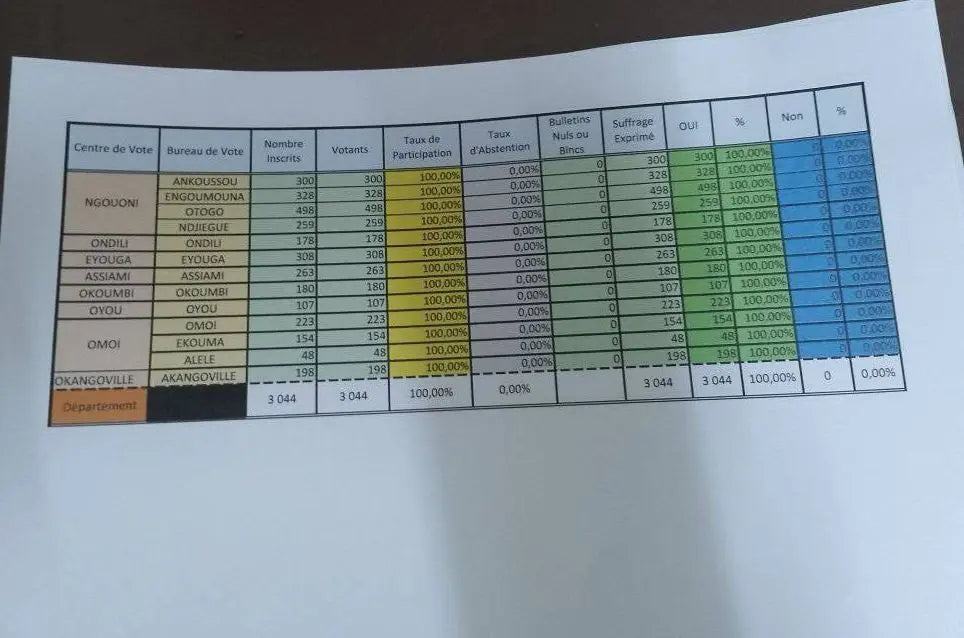
A closely watched observer: Cécile Abadie on the Gabonese referendum
Gabon's 2024 constitutional referendum, which is expected to mark a crucial stage in the country's political transition, is at the heart of heated controversy. Beyond questions about how the vote will be conducted, the role of international observers is also being closely scrutinized. Among them, Cécile Abadie, the European Union's ambassador to Gabon, is in the spotlight. In a climate marked by inconsistent electoral figures and accusations of foreign interference, her impartiality is being put to the test.
A seasoned diplomat, but in the spotlight
Appointed in September 2023, Cécile Abadie represents the European Union in a region where political challenges are numerous. Recognized for her expertise in managing political transitions and governance, she has placed the strengthening of democratic institutions and economic cooperation at the heart of her mandate in Libreville. However, her role as an observer during the referendum places her in a delicate position, where every gesture is analyzed and every word dissected.

Absurd inconsistencies in the poll figures
As soon as the polls closed, a series of anomalies were noted, raising doubts about the credibility of the official results. These anomalies come from an official document made public by the Ministry of the Interior, entitled "REFERENDUM 2024: OBSERVATIONS AND TRENDS" . This document, which is supposed to present the trends of the vote, contains numerous errors and inconsistencies that have been widely criticized.

"Screenshot taken from the official document of the 2024 referendum: this table shows a glaring error where the total of votes for 'Yes' (201) and 'No' (35) reaches 236, thus exceeding the number of voters announced (201)."

Uniform and improbable results
Several polling stations reported turnouts and results in favor of "YES" reaching 100%, which is highly unlikely in a democratic election. For example:
- Lekabi Lewolo: In the 11 polling stations in this locality, all those registered voted, and all voted "YES".
- Ekouma: All 154 registered voters voted "YES", with no votes for "NO" or invalid ballots.
- Ankoussou: With 300 registered voters, the turnout was 100%, and 100% of the votes went to "YES".
Such results suggest a complete lack of diversity of opinions, which is statistically very unlikely and raises suspicions about the transparency of the vote.
Glaring miscalculations
Mathematical inconsistencies were noted in the official document of the Ministry of the Interior:
- Votes cast exceed voters: In the department of Zadié, the document indicates 1,158 voters for 1,307 votes cast, or 149 votes more than the number of voters.
- Incorrect percentages: At Ambowe office 4, the percentage of "YES" is indicated as 78.97%, while the correct calculation gives 70.92%.
- Inconsistent totals: In Abidjan, the total of "YES" and "NO" votes is 190, but the number of voters is announced as 192, leaving two votes unexplained.
These errors raise questions about the seriousness and rigor with which the election data was compiled. Some observers have called these anomalies total amateurism, calling into question the reliability of the official results.
Missing data and methodological problems
The Interior Ministry document also has significant shortcomings:
- Lack of key data: In some polling stations such as Zoatab Office 2, the number of registered voters is not mentioned, although 182 voters are registered.
- Percentages not calculated: Several polling stations do not provide participation rates or percentages of votes cast, making any transparent analysis difficult.
- Typographical errors: Mistakes such as "Bulle7ns" instead of "Bulletins" indicate a lack of care in the presentation of the official document.
The lack of transparency on the methodology of data collection and compilation heightens doubts about the credibility of the poll.
Surprising international results
The inconsistencies are not limited to Gabonese territory. The results from polling stations abroad also show anomalies:
- China: A uniform rate of 97% in favor of "YES" is reported in all offices (Beijing, Shanghai, Wuhan), without any variation.
- United States and France: A large victory for "YES" is announced without detailed figures or analysis of "NO" votes or invalid ballots.
These uniform international results are improbable and fuel suspicions about the reliability of the figures communicated.
The European Union: an ambiguous neutrality
The official role
Present during the vote, the European Union, through its ambassador to Gabon, Cécile Abadie, clarified that it was not operating as an official observation mission. Its involvement is limited to a technical analysis of the legal and organizational aspects of the referendum.
Critical
This ambivalent position raises questions. If the European Union limits itself to a technical role, why accept a presence that could be interpreted as a guarantee of the electoral process? In a context where the legitimacy of the results is strongly contested, their moral responsibility cannot be evaded. International observers are called upon to assume the consequences of their presence, especially when such flagrant anomalies are noted.
Observers under surveillance
In this troubled context, international observers, and Cécile Abadie in particular, are aware that their role is being scrutinized by public opinion and political actors. They are now observed as much as they observe, and their ability to identify anomalies and demand explanations is crucial for the credibility of the electoral process.
Voices are being raised asking observers not to endorse results tainted by flagrant irregularities. Their silence or inaction in the face of these absurdities could be interpreted as tacit complicity with the authorities in place.
Interference or duty of transparency?
Cécile Abadie's presence is perceived ambivalently. While some believe she can help ensure the transparency of the vote, others accuse her of interference. The challenge for her is to navigate between these perceptions while remaining faithful to her mandate as an impartial observer.
She will also have to deal with possible restrictions imposed by the Gabonese authorities, which could limit her room for maneuver. Her access to essential information and her freedom of movement will be crucial to successfully carrying out her mission.
The weight of responsibility
Faced with these anomalies and the expectations of the international community, Cécile Abadie finds herself in a position where her action or inaction will have significant consequences. She will have to decide whether to denounce the observed inconsistencies or to validate a contested electoral process.
This situation underlines that international observers are not only witnesses, but also actors who can influence the course of events through their positions.
In a context where observers are themselves observed, it is essential that they fully assume their responsibilities. Their commitment to transparency and democracy will be decisive for the political future of Gabon.





